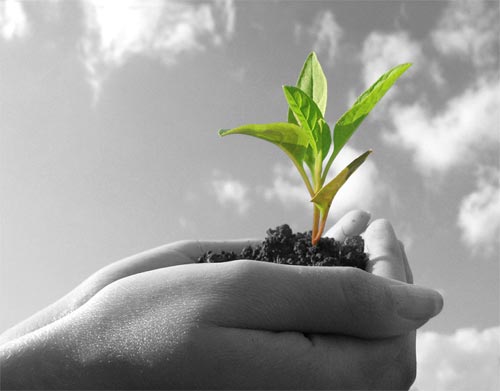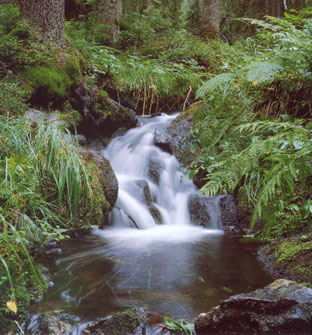|

Kurdistanís wealth of high-grade pasturelands has long made it suitable for a pastoralist economy, but it is equally suitable in many areas for intensive agriculture. The pasturelands have remained in reasonably good condition and continue to be a productive source of animal feed. The rich pastures have always ensured that in all historical periods, regardless of how dominant the agricultural sector, there have been nomadic herdsmen exploiting this economic niche to its fullest.
Large and fertile mountain valleys provide ample space for agriculture. Despite its mountainous nature, Kurdistan has more arable land proportionately (28% of its total surface area) than the majority of Middle Eastern countries. Expansive river valleys create a lattice work of fertile fields in Kurdistan, except in the region of the central massif. This may very well explain the fact that many experts feel that agriculture was invented in Kurdistan, as was the domestication of almost all basic cereals and livestock, with the notable exceptions of cows and rice. Since then, the economy has always had an agricultural base, albeit with varying degrees of importance.
A great variety of cereals and vegetables have traditionally been grown in Kurdistan, with wheat and barley the most common. Rice has more recently been given growing preference, and it is displacing bread as the basic food of choice of the Kurdish middle class. Cash crops like tobacco, sugar beets, and cotton are playing a growing role in the local economy. The tobacco is of good quality, with pipe tobacco (also the tobacco of choice for water pipes) of the region being in great demand throughout the Middle East.
Wild berries, particularly black and white mulberries, are found in almost every village, with production for market increasing each year. Mulberries, and to a lesser extent barberries, are currently the berries of choice. Dried, they are used throughout the year. The fruits, including grapes, are grown in large tracts of land. Some quantity is also collected from wild stands. They play an important role in the Kurdish diet, particularly in their dried forms.


|

The ancient history about agriculture in Kurdistan
. . . In ice age which happened around half a million years ago and finished 20000 years BC, most of the European areas and North America were totally covered with ice. At that time the desert areas, wide plain areas in Africa, and the Arabic lands had average weather. Kurdistan had a relatively rainy and average weather, as well.
Ancient human beings were using caves as shelters, and the plain areas as hunting fields. They depended on hunting as food resource. That's why they had to make tools for hunting. At the beginning, they had sharp stones, then they used bones, after that they made other tools for that purpose.
This stage in Mankind history is called Stone Age:
Stone Age is divided into:
1- Old Stone Age:
This age lasted for 35000 years, in which large stony axes and sharp stones were made. It is said that in this age human beings looked like monkeys. The remainders of this culture were found in 1949 in a place called (Berdebalak) which is one kilometers away from the city of (Chemchemal).
2- Middle Stone Age:
In this age, Neanderthals had appeared who lived in caves. The remainders of those people and their culture were found in (Shanedar) cave in the mountains of Kurdistan, which is located in the southern part of (Bradost) mountain and is up the big (Zab) river and it is not very far from the city of (Rawanduz). This cave was instructed of four flours.
3- New Stone Age:
The beginning of this age belongs to 30000 years ago. In this stage, some developed tools were made of stones, bones, and elephant teeth . . .
The human beings in that age are called (homospuns) , and their civilization is called (Cromanion). The archaeologists' investigations and researches show that Kurdistan province was a homeland of the primitive human beings in the past.
Agriculture
The human beings who had lived in Kurdistan passed the hunting stage and entered the Stage of Agriculture 3500 years before the Europeans did.
Because of the suitable weather in Kurdistan for growing spontaneous wheat, human beings entered the agricultural stage 10000 years ago. There are some evidences, especially four important areas in Kurdistan that prove this truth:
1- In Shanedar, near Rawanduz , axes and sharp stones and agricultural tools were found.
2- In Kareemshar near Chemchemal, stony sickles, axes, sharp stones and pre-agricultural tools were found.
3- In Melfat between Kirkuk and Hawler, some stone-derived tools and sickles were found. Here, these tools show the beginning of the agricultural stage.
4- In Charmo near Chemchemal in the southern part of Kurdistan, twelve civilizations were found, for example; pots made of fried mud, animal statues made of mud, the most primitive textile tools, some solid wheat and barley, some animal bones that show the their dependence on livestock at that time, and a statue of a pregnant woman made of mud.
According to archaeologists, people inhabited in Charmo village 6700 years ago. This is the oldest village in the world. In 1985, American, German, and Turkish archaeologists found a house underground in (Arkhen) province in Dyarbakir, which was 9000 years old.
Thus, the evidences show that the ancient human beings chose Kurdistan as their home. In cold weathers, they used the caves as shelters and in average weathers they lived in the plain areas where they learnt agriculture and kept livestock. They made tools from stones and bones. On the cave walls they engraved figures. They made statues from mud and fried them by fire. Thus, in this place in the world, they opened the gate of civilization for human beings. . .
Source:
Dyako Site
For more information, you can visit this web site (in Kurdish language):
http://www.geocities .comdyako700/seretameju.htm |